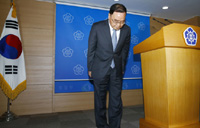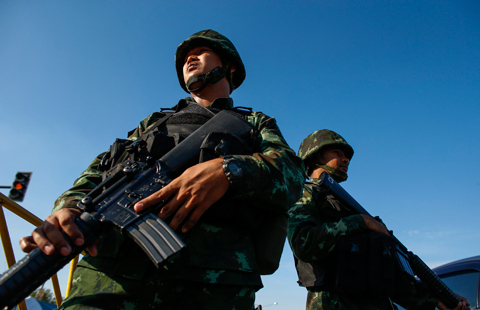S. Korea names new PM, spy chief
(Xinhua) Updated: 2014-06-10 15:39SEOUL - South Korean President Park Geun-hye on Tuesday nominated new prime minister and spy agency chief amid growing demand for cabinet reshuffle after the ferry sinking disaster.
|
 S Korean PM resigns over govt response to ferry disaster |
The ferry Sewol capsized and sank off the southwestern coast on April 16, leaving more than 300 people, mostly high school students, dead or missing. Chung offered to resign from the country's No. 2 administrative position to take responsibility for one of the country's deadliest maritime accidents.
The Park Geun-hye administration has been under harsh criticism for the bungling of its initial rescue operations and lax safety standards, bringing Park's approval rating to fall below 50 percent for the first time since her inauguration in February last year.
The post of prime minister in South Korea is largely ceremonial as executive power is centered on the president. Prime ministers here tended to step down to take responsibility for political scandals or policy failure.
Moon was born in Chungcheong province, seen here as the relatively gray area in domestic politics, as the region neither belongs to the Gyeongsang province, or a home turf of the ruling Saenuri Party, nor the Jeolla province, or a political base for the main opposition New Politics Alliance for Democracy (NPAD).
The spokesman said the prime minister nominee is an ex- journalist with firm convictions and determinations, who made efforts to put right wrong practices and evils through rational alternatives and the cool-headed criticism.
Min said the nominee will push for key state affairs such as overhauling the bureaucratic society and normalizing abnormal practices based on his excellent insight and impellent ability.
Such appointment came after former Prime Minister nominee Ahn Dai-hee withdrew his candidacy for the No. 2 government post on May 28 amid mounting criticism over his excessive salary as a lawyer in the past.
Ahn, former Supreme Court justice, served as a lawyer at a law firm for five months, and earned 1.6 billion won (1.57 million US dollars) during the five-month period.
It triggered backlashes from the opposition parties for his exorbitant salary, which critics said was granted as the privilege from his former post as a Supreme Court justice.
Meanwhile, South Korean ambassador to Japan Lee Byung-ki was named as new chief of the National Intelligence Service (NIS), the country's spy agency.
Lee served as director-general of the National Security Planning Agency (NSPA), the spy agency's predecessor, and a researcher at the Korea National Diplomatic Academy, the state-run think tank on foreign affairs and security.
The spokesman said the NIS nominee is a competent person who can lead the spy agency's unique role amid the grave inter-Korean situations and carry out its reform plan.
Former NIS chief Nam Jae-joon offered to resign on May 22 as Nam has been a longtime target of criticism since Park took office in February 2013. The spy agency has been criticized for its intervention in the 2012 presidential election and for its fabrication of evidence to charge a former Seoul municipal government official with espionage.
President Park apologized for the spy agency's evidence forgery scandal on April 15, right a day before the ferry sinking disaster occurred.
- South Korea garden
- 6 killed by fire in South Korea
- Civilian diver dies in South Korea ferry searches
- People suffer in funeral for victims, South Korea
- Hundreds still missing in South Korea's ferry sinking
- US, South Korea hold joint live-fire military exercise
- South Korea eyes China's financial market










